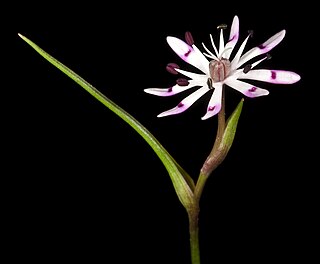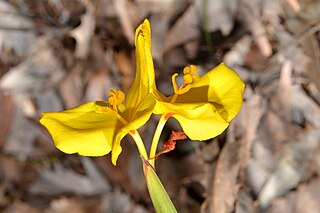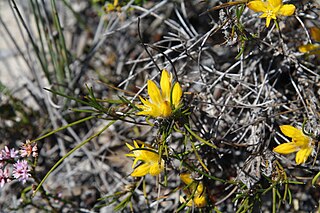
Hibbertia stellaris, commonly known as star guinea flower or orange stars, is a brilliantly orange flowering ground cover from the South Western Australian botanical province. It naturally grows in swamps; despite this, it is extremely sensitive to phytophthora and needs to be grown in well-drained soil in cultivation.
Chthonocephalus is a genus of annual herbs in the family Asteraceae. The genus is endemic to Australia, with species occurring in all mainland states.
Anigozanthos preissii, the Albany cat's paw, is a herbaceous plant species in the family Haemodoraceae, endemic to Western Australia.

Xanthorrhoea preissii, known as balga, is a widespread species of perennial monocot in Southwest Australia.

Hypocalymma strictum is a species of flowering plant in the myrtle family Myrtaceae, and is endemic to the south west of Western Australia. It is an erect shrub with linear leaves, triangular in cross section, and deep pink flowers with 30 to 50 stamens.

Pterostylis turfosa, commonly known as the bearded bird orchid, is a species of orchid which is endemic to the south-west of Western Australia. Flowering plants have a single translucent green flower with darker green veins, on a flowering stem with up to eighteen stem leaves. It is one of a number of bearded orchids, some of which have yet to be formally described, all of which have a distinctive feather-like labellum.

Tribonanthes violacea belongs to the genus Tribonanthes in the bloodwort family, Haemodoraceae. It was first described by Stephan Endlicher in 1846. It is a perennial herb growing from 0.05 to 0.2 m high, in peat, white, grey or yellow sands, clay loams and granite in areas which are seasonally wet and on granite outcrops. Its white to purple flowers are seen from July to October.
Plantae preissianae sive enumeratio plantarum quas in australasia occidentali et meridionali-occidentali annis 1838-1841 collegit Ludovicus Preiss, more commonly known as Plantae preissianae, is a book written by Johann Georg Christian Lehmann and Ludwig Preiss.

Wurmbea tenella, common name - eight nancy, is a perennial herb in the Colchicaceae family that is native to Western Australia.

Anigozanthos viridis, commonly known as Green Kangaroo Paw, is a grass-like perennial herb native to south western coastal regions of Western Australia. The Noongar peoples know the plant as Koroylbardany.

Anigozanthos bicolor, commonly known as cat's paw, little kangaroo paw or two coloured kangaroo paw, is a grass-like perennial herb native to the south western coastal parts of Western Australia.
Patersonia limbata is a species of plant in the iris family Iridaceae and is endemic to the south of Western Australia. It is a tufted, rhizome-forming herb with sword-shaped, bordered leaves and violet tepals.
Patersonia rudis, commonly known as hairy flag, is a species of plant in the iris family Iridaceae and is endemic to the south-west of Western Australia. It is a tufted, rhizome-forming perennial herb with linear to sword-shaped leaves and violet tepals.

Patersonia umbrosa, commonly known as yellow flags, is a species of plant in the iris family Iridaceae and is endemic to the south-west of Western Australia. It is a loosely-tufted, rhizome-forming, perennial herb with linear to sword-shaped leaves and deep bluish-violet or bright yellow tepals.
Caladenia nana, commonly known as pink fan orchid, is a plant in the orchid family Orchidaceae and is endemic to the south-west of Western Australia. It is a clump-forming ground orchid with a single linear leaf and up to 6 pale pink to rose pink flowers.

Johnsonia acaulis is a plant in the family Asphodelaceae and is endemic to the south-west of Western Australia. It is a rhizomatous, tufted, or grass-like perennial with white, pink or green flowers.

Johnsonia teretifolia, common known as hooded lily, is a plant in the family Asphodelaceae and is endemic to the south-west of Western Australia. It is a rhizomatous, tufted, or grass-like perennial with white, pink or green flowers.

Conostylis festucacea is a rhizomatous, tufted or proliferous perennial, grass-like plant or herb in the family Haemodoraceae, and is endemic to the south-west of Western Australia. It has cylindrical or flat leaves and yellow flowers.

Conostylis misera, commonly known as grass conostylis, is a prostrate, rhizomatous, tufted perennial, grass-like plant or herb in the family Haemodoraceae, and is endemic to the south-west of Western Australia. It has flat leaves and bright yellow flowers usually arranged singly on a short flowering stem.

Conostylis vaginata, commonly known as sheath conostylis, is a rhizomatous, tufted perennial, grass-like plant or herb in the family Haemodoraceae, and is endemic to the south of Western Australia. It has much-branched stems, grass-like leaves and yellow flowers arranged at the base of the leaves.














